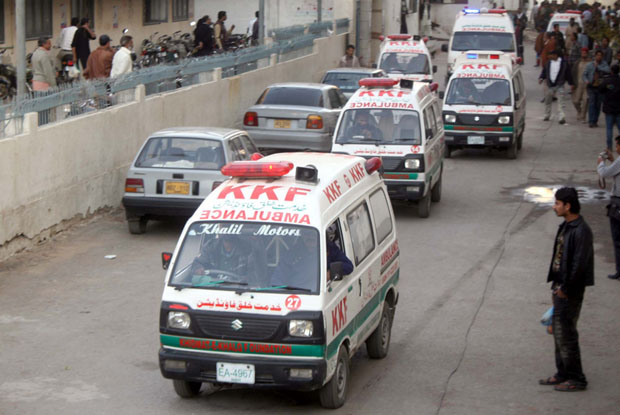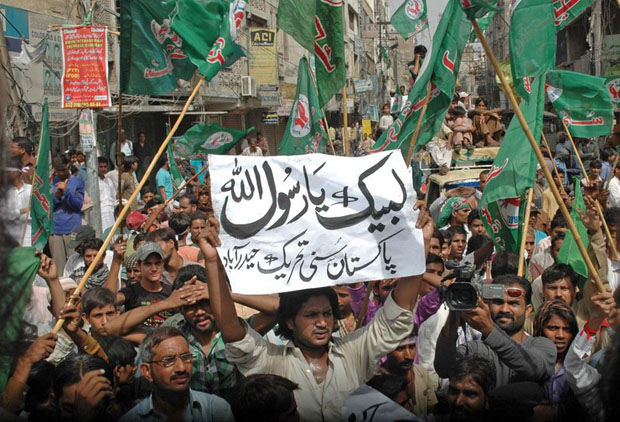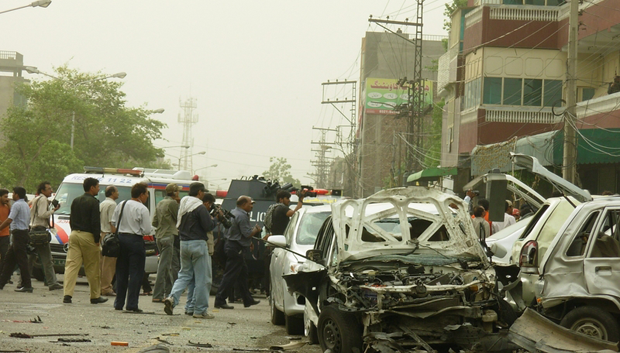Index relies entirely on the support of donors and readers to do its work.
Help us keep amplifying censored voices today.

The ambulances transporting the bodies of the six young men killed in Gadap Town on the outskirts of Karachi (Image: Ppiimages/Demotix)
In a fresh wave of violence that gripped the southern port city of Karachi at the turn of the new year, six young devotees of Sufi saint Ayub Shah in Gadap Town, on the outskirts of the city, were killed on January 7. Their bodies were found by the caretaker the following morning in a mud-house close to the shrine.
A note left near the dead, allegedly by the Tehrik Taliban Pakistan (TTP), stated that a similar fate awaited anyone visiting the shrine. The police told AFP the note said: “Stop visiting shrines!”
Sufism, strongly practiced in Pakistan’s Sindh province, is opposed by the Taliban who follow the Wahabi and Salafist school of Islam.
The brutal killings have reinforced the long-standing fear among the people of Karachi that the militant group which infiltrated the city a few years ago has now not only consolidated itself, but is also imposing its belief system.
“The part of Karachi where this incident took place is a known stronghold of the Taliban,” explained Imtiaz Ali, correspondent for Dawn newspaper. He said Wall Street journalist Daniel Pearl’s body was also found in Gadap. Taliban commander Mullah Abdul Ghani Baradar, also one of the four men who founded the Taliban movement in Afghanistan in 1994, was arrested from there in 2010. Gadap has often been in the news during anti-polio campaigns which have had to be suspended in recent years after attacks on vaccinators and health workers.
Just a month back, 25-year-old Bilawal Bhutto Zardari, son of former prime minister Benazir Bhutto, had warned of the Talibanisation of Pakistan. “They are surrendering our culture, our history, our identity and our religion based on a lie cloaked in an imported, fictionalised version of Islam,” he said at an event announcing a two-week cultural festival to take place in February.
While Karachi is no stranger to violence, Ambreen Agha, research assistant at New Delhi’s Institute for Conflict Management, agreed with Zardari. This particular incident, she said, should definitely ring alarm bells for Pakistan’s security apparatus as it indicated the “deeper penetration” of Pakistani Taliban in the city.
“The TTP’s upward mobility should be taken as a serious threat for the concerned agencies,” she said, warning that the gradual trickling down of the “Talibanised ideology” posed a potent threat to the establishment.
It also puts a big question mark on the targeted “operation” carried out by security forces and law enforcement agencies in the city, which have been ongoing since September. Touted as a success by the government, Sindh governor Ishratul Ibad last week voiced his satisfaction, saying there was a “significant decrease” in target killings and kidnappings for ransom.
Labelling the operation nothing but “buffoonery and horseplay”, Agha, however, pointed out: “The tact with which the outfit [Taliban] carries out its activities and the pattern that they follow in the metropolitan city suggests something more than what meets the eye.” She added: “TTP’s operational success suggests implicit collusion with the gangsters and their political patrons.”
“The claims of success by the Rangers [paramilitary force] should be questioned,” said Zohra Yusuf, the chairperson of the independent Human Rights Commission of Pakistan.
Naeem Sadiq’s, a citizen of Karachi, says the militant attacks “are a result of the armed private militias, so faithfully encouraged by the government’s own ‘proliferation of weapons’ policy.” He believes the only way to prevent incidents like Gaddap, is to cleanse the city of weapons and has filed a petition in the Supreme Court of Pakistan calling for this. “De-weaoponise all individuals and groups – starting with the world’s most militant parliament with its 69,473 prohibited bore weapons!” he said.
This article was posted on 10 Jan 2014 at indexoncensorship.org

Protest in Hyderabad, Pakistan against the film Innocence of Muslims, which got YouTube blocked in the country (Image: Rajput Yasir/Demotix)
The last year saw Pakistan successfully transferring power from one democratically elected government to another. A norm in many countries worldwide, this was a milestone for Pakistani citizens. However, while a peaceful transition is welcome, there have been few changes in policy making and inclusion of citizens and civil society in due process when it comes to the country’s deteriorating state of cyberspace, digital security and surveillance issues.
Last year proved to be a bumpy ride too for Pakistan. From one ban to another broken promise, the Pakistani internet community really didn’t have much to be happy about. YouTube was first blocked by the previous government in September 2012 after a blasphemous movie named “The Innocence of Muslims” was uploaded, and remained blocked as of 31 December 2013.
In January, a Pakistan daily reported that the Pakistan Telecommunication Authority (PTA) and the Ministry of Information Technology (MoIT) were planning to install a regulatory system, reportedly imported from China, to monitor websites, online content and also internet filtration. Throughout the year, officials tried to systemize online content filtering mechanism, especially getting a boost after the YouTube fiasco.
A further blow came when Vimeo, another video sharing site, was found to be inaccessible in the country. In May, a band released a satirical song criticising military generals. The lyrics made fun of the army hitting out at their intolerance and corruption: When pockets are full/all the strings are theirs to pull/If it’s one of them you give a naughty look to/very soon you will disappear from view. The video was uploaded on Vimeo and went viral, and in turn led to the site being blocked.
On 2 June, a plethora of users found Tumblr inaccessible in some regions of Baluchistan and Sindh. That same month, an extensive report by Citizen Lab found the Pakistani government to be using the technology from Canadian company Netsweeper, along with DNS tampering, for political and social filtering.
Another ban appeared to have been imposed when Viber users started complaining about not being able to make calls. Viber is an app that supports text messaging and Voice-over Internet Protocol (VoIP) for making free internet calls. Tribune Pakistan recorded complains from around the country including from Karachi, Hyderabad, Multan, Rawalpindi, Faisalabad, and Gujranwala.
Freedom House released its annual “Freedom on the Net” Pakistan country report in October. Among the 60 researched countries, the report placed Pakistan in bottom 10 for its privacy and surveillance concerns. According to this report, at least three cybercafés and mobile phone stores were attacked by religious extremist on moral grounds — something the Pakistani government has yet to fight against.
November brought quite depressing news when a young boy was accused of blasphemy for allegedly sharing objectionable content on Facebook. This was the first time social media was used as a evidence and set a dangerous precedent in a country without any cyber laws. November also saw the Internet Movies Database (IMDb) blocked in the country after Internet Service Providers (ISPs) received a directive from the state. Following online outcry against the ban, it was reversed after only a couple of days.
This was soon followed by Pakistan’s very first case of selective blocking, where the government managed to target specific pages rather than entire platforms. On 25 November, 2013, users across the country reported the inaccessibility of Baloch movie “The Line of Freedom”. The government has time and again tried to use any and all sorts of means to curb dissidents’ views, especially those from the Baluchistan province. While IMDb, Vimeo and other sites remained accessible, the pages of the aforementioned movie were blocked.
Instead of removing the ban on YouTube after having a successful test case of selective blocking, the Pakistani government is currently in talks with Google, Inc. to localise YouTube in the country. This will empower the government to more frequently and easily ban any material that it deems unfit for the nation without ever taking citizens’ views into account.
If anything, the year 2013 only brought despair and hopelessness to Pakistan’s growing number of internet users. From one step to another, the new democratically-elected government is using draconian censorship and surveillance means and systems, affecting the rich exuberance of the country’s online community.
This article was originally posted on 8 Jan 2014 at indexoncensorship.org

Chinese websites
In 2010 China shut down 1.3 million web sites with popular pages, such as Facebook, YouTube and Twitter, blocked. Three years later and China has employed over 2,000,000 people to monitor microblogging sites, a further clampdown on free speech in the country.
Having blocked major social media sites it’s not surprising that a large percentage of China’s hundreds of millions web users have turned to microblogging sites to offer up their opinions on society. Although the Beijing News stated that the monitors are not required to delete posts they view online they do gather data by searching for negative terms relating to their clients and compiling the information gathered into reports.
Weibo, China’s largest microblogging platform, has more than 500 million registered users who post 100 million messages daily. Postings on the website that criticise the Chinese government are often removed.
Global internet access
The internet is often taken for granted by those with regular and easy access to the online world. However, a staggering 4.6 billion people live without access to it; that’s around 68% of the global population. The number of internet users has grown by 566% since 2000 but considering the positive effects the internet can have on employment, communications and finances more of the world should have access to this valuable resource.
Africa has the poorest access to the internet; only 7% of total global internet usage comes out of the continent with, on average, 15.6% of the population using the internet.
YouTube
YouTube was bought by Google in 2006. Seven years later and localised versions of the video sharing site have been implemented in 56 countries, allowing for the content posted on to YouTube to be tailored specifically to the country it is serving. Although localising YouTube for specific countries can help with issues surrounding copyright, it also means that governments can block specific content from being uploaded and viewed on the website.
In Pakistan the online video sharing site has been banned since 2012. Google is looking to localise YouTube in the country, allowing the population access to the site, but only if the search engine makes it easier to block any blasphemous or objectionable content. Iran, Tajikistan and China are the only other countries with a block on YouTube.
India and the internet
India may be able to claim to be the world’s third largest internet user (behind the U.S and China) but that does not mean the country’s 74 million internet users have free access to the web. According to the Google Transparency Report, India leads the way in the number of take-down requests issued. Between July and December 2012 Indian authorities requested, without court orders, that 2,529 items be removed from the internet- a 90 percent increase from the first half of 2012.
In 2013 amendments were made to the Information Technology (Intermediaries Guidelines) Rules which stated, under Section 79 of the IT Act, that intermediaries had only 36 hours to respond to complaints or content deemed by regulators to be “grossly harmful” or “ethnically objectionable”. The clarification meant that this content does not have to be removed from the web, but failure to respond or acknowledge to the request within the short time frame, which does not take into account weekends or holidays, can result in a criminal procedure.
This article was posted on Jan 3 2013 at indexoncensorship.org

In May 2010, terrorists attacked two mosques belonging to the Ahmadi community. Ninety-four people were killes and more than 120 were injured. (Photo: Aown Ali / Demotix)
“It was staged and pre-planned,” said Shahid Attaullah, referring to the arrest of a homeopath Dr Masood Ahmed on charges of blasphemy.
Narrating the details of the events preceding the arrest of a 72-year old doctor, who is also a British national, Attaullah, the spokesperson for the Ahmaddiya Jamaat, said: “Two men posing as patients, came to his clinic in the Anarkali, an older part of Lahore, on November 25. After a few minutes they started discussing religion. Supposedly the doctor responded to their questions about Islam and then they left. Within minutes, a mob gathered around the clinic. A complaint was lodged and the police arrested him for preaching. He is in lock-up and his bail denied.”
According to news reports, the doctor was arrested for ‘posing’ as a Muslim.
Ahmadis consider themselves Muslims but in 1974, the government promulgated an ordinance, declaring them non-Muslims. According to Pakistan’s constitution, this community cannot call themselves Muslims; are banned from referring to their places of worship as mosques and cannot recite the Kalima, which is the first tenet of Islam, whereby a Muslim proclaims that he is a Muslim. The Ahmadis are banned from even singing hymns in praise of Prophet Muhammad. Of late there have been incidents where they have been harassed for keeping Muslim names.
Attaullah sees this to be a long-drawn case now that a first information report (FIR) has been lodged. “It is now gone into the court.” Last year 20 trumped up charges were registered, while this year as many as 33 people have so far been booked including the doctor.
According to Attaullah while there are some judges who are themselves prejudiced towards the community, those who are not are pressured by religious hardliners.
“There was a case where the judge of the Lahore High Court refused to take decision and sent the application back to the lower court. This is quite unprecedented. Two months ago in another case, after the judge granted bail to the accused, a group of clerics went to the judge’s chamber. I don’t know what transpired inside, but a little later, the judge changed the written order stating ‘no bail’”.
This does not surprise Zohra Yusuf, the chairperson of the independent Human Rights Commission of Pakistan. “I can understand the judge’s predicament because a lot of power has been ceded to the clerics and most people buckle under their threats,” she said.
Since 1984, 299 people belonging to the community have been charged under the blasphemy law, 764 booked for displaying the Kalima; 38 for the Azan (calling to prayer); 447 ‘posing’ as Muslims; 93 for offering prayers, 770 for preaching and hundreds others for many such offences.
Little wonder then that Attaullah says: “There is always the sword of Damocles hanging over all of us and the mental anguish is permanent”.
“Many of our youngsters are migrating to other countries,” he said. “They do not see a future in Pakistan and the elderly members don’t want to leave the country they think is theirs,” he pointed out the social quandary they find themselves in.
The religious apartheid has become overt with the oppressors having declared an all out war. “In the last few years, I find the persecution has escalated and the attacks on us are pre-meditated and carried out in a planned manner,” said Attaullah. He further added: “And they always pick on the weaker elements of our community.”
In addition, said Yusuf: “The persecution of Ahmadis knows no bounds and, regrettably, there’s not enough condemnation from society or the media.”
According to Attaullah, the space for Ahmadis in Pakistan is getting narrower by the day.
Talking about the doctor’s arrest, he said: “The complainants had filmed the unsuspecting man reading aloud the translation of a verse from the Quran through the hidden camera.”
A Lahore-based journalist, requesting his name be withheld, (as he has received threats by an Islamic group for covering faith-based issues) has seen the video clip: “It was clear the doctor was trapped into saying what he said, but he was not preaching,” he said.
Further, said the journalist: “Ahmadis don’t talk about religion publicly and never to strangers; these people must be known to him and from the video it seemed they were asking him questions and he was responding to them.”
Attaullah, said they regularly circulate directives telling their people not to participate in any religious discussions with anyone and if the opposite sides wants to pull them in, they should simply disclose they are Ahmadis and the law does not allow them to speak on Islam.
This article was posted on 23 Dec 2013 at indexoncensorship.org
This article was updated to correct an error. Ahmadis were declared non-Muslims in 1974, not 1984 as previously stated.